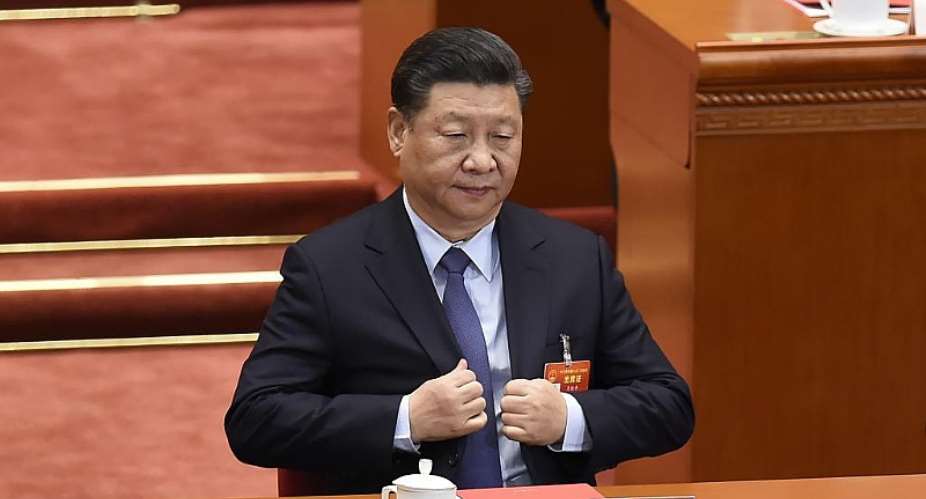As Chinese President Xi Jinping begins a visit to Italy, Monaco, and France, the European Union is considering a more defensive commercial strategy with regard to China.
Caught between a new US-Chinese rivalry for economic and military dominance, EU leaders will try to find an elusive middle-path during dinner at their Brussels summit on Thursday evening. It will be the first time the European leaders have discussed the issue of commercial relations with Beijing.
Despite the desire in Brussels to forge a common stance, Italy - where eurosceptics share power in a populist coalition - is expected to sign major bilateral trade deals during Xi's visit.
European Trade Commissioner Cecilia Malmstrom told a conference on transatlantic relations earlier on Thursday that the international economic order has changed.
"China has risen to become an economic and geopolitical competitor, and a systemic competitor," she said before EU leaders met for talks on both Brexit and European relations with China, the world's second-largest economy.
A united front
With China's Xi starting a tour of France and Italy, EU leaders - who have often been divided over China - want to present a united front ahead of an EU-China summit scheduled to take place on 9 April.
According to a draft April summit statement, the EU is seeking to set deadlines for China to make good on trade and investment pledges that have been repeatedly pushed back.
That was the message delivered to State Councillor Wang Yi by EU foreign ministers on Monday. It marked a shift toward what EU diplomats say is a more "assertive and competitive mindset".
"In the past, it has been extremely difficult for the EU to formulate a clear strategy on China, and past policy documents have not been strategically coherent," according to Duncan Freeman at the EU-China Research Centre at the College of Europe. "There is now a clear effort to do that."
US President Donald Trump's campaign to warn against Huawei telecommunications equipment in next-generation wireless networks has also accelerated EU discussions about its position.
Malmstrom said Europe very often agreed with the United States on what global problems were, but not always on the cure - including US tariffs on EU imports and Washington's trade war with Beijing.
"It is tempting to try to lock out China, to decouple rather than to discipline. That might work in the short term. But the long term requires a deeper fix, systemic reforms built to last," she said, urging transatlantic cooperation on the issue.
The deepest tensions centre on China's slowness to open up its economy, a surge of Chinese takeovers in critical sectors in the EU and an impression that Beijing has not stood up for free trade.
Germany is the key
With over a billion euros every day in bilateral trade, the EU is China's top trading partner, while China is second only to the United States as a market for European goods and services.
Chinese trade restrictions are more severe than EU barriers in almost every economic sector, according to research firm Rhodium Group and the Mercator Institute for China Studies.
Any new EU policies will be complicated to implement, as individual EU capitals continue to court Chinese investment.
Italy plans to join China's multi-billion-dollar Belt and Road infrastructure project, while free traders Ireland, Sweden and the Netherlands are wary of any restrictions on commerce.
Germany's views will be important as Berlin has at times pressed for a tougher answer to unfair competition from Chinese rivals but has also championed a closer relationship with Beijing.
"Their position needs to stabilise. At the moment it changes almost every day of the week," according to State Councillor Wang Yi.
---With AFP





 Tuesday’s downpour destroys ceiling of Circuit Court '8' in Accra
Tuesday’s downpour destroys ceiling of Circuit Court '8' in Accra
 SOEs shouldn't compromise on ethical standards, accountability – Akufo-Addo
SOEs shouldn't compromise on ethical standards, accountability – Akufo-Addo
 Father of 2-year-old boy attacked by dog appeals for financial support
Father of 2-year-old boy attacked by dog appeals for financial support
 Jubilee House National Security Operative allegedly swindles businessman over sa...
Jubilee House National Security Operative allegedly swindles businessman over sa...
 Nobody can order dumsor timetable except Energy Minister – Osafo-Maafo
Nobody can order dumsor timetable except Energy Minister – Osafo-Maafo
 Mahama wishes National Chief Imam as he clock 105 years today
Mahama wishes National Chief Imam as he clock 105 years today
 J.B.Danquah Adu’s murder trial: Case adjourned to April 29
J.B.Danquah Adu’s murder trial: Case adjourned to April 29
 High Court issues arrest warrant for former MASLOC Boss
High Court issues arrest warrant for former MASLOC Boss
 Align academic curriculum with industry needs — Stanbic Bank Ghana CEO advocates
Align academic curriculum with industry needs — Stanbic Bank Ghana CEO advocates
 Election 2024: We'll declare the results and let Ghanaians know we've won - Manh...
Election 2024: We'll declare the results and let Ghanaians know we've won - Manh...
